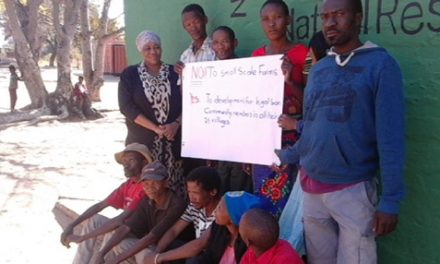
Bidvest to put N$500 million into horse mackerel processing on land
Diversified investment company, Bidvest Namibia, said its fisheries division is on the cusp of making a very substantial infrastructure investment to boost fish processing on land, supporting the Ministry of Fisheries and Marine Resources’ policy of increasing local value adding.
In his ministerial address earlier in the year, Minister of Fisheries and Marine Resources, Hon. Bernard Esau introduced a requirement for 2% of the total allowable catch for horse mackerel to be allocated to canning, a move aimed at spurring value addition of the most plentiful marine fish resource. The requirement, according to the ministry, is an attempt to spur job creation, and align the fishing industry with the fourth National Development Plan’s “Growth at Home” strategy.
In a quest to heed the ministry’s call to direct 2% of the total allowable catch for horse mackerel to canning initiatives, Bidvest Namibia Fisheries responded positively and may potentially invest as much as N$500 million into its horse mackerel value addition drive. Bidvest has since sought the services of an international expert who will conduct the feasibility study.
Responding to questions from the Economist, Bidvest Namibia Fisheries Managing Director, Jan Arnold said, “This feasibility study will incorporate the interpretation of the catches and quality reports from the experiment. Given these findings, the feasibility study will look at all aspects of shore processing.”
Various activities will be carried out for the feasibility and will include the extraction of high value protein from fishmeal, normal bulk production, the production of value added products like crumbed portions, determining the vessels that will be utilised and the various methods of catching, and the creation of retail packs from specialised freezing methods, Arnold added.
He said “Costings and returns will be integral in this study. A big component will be the land, buildings, quays, jetties, cold store and ancillary equipment. We hope to conclude this by the end of 2014 for presenting to the Ministry of Fisheries and Marine Resources and our boards for consideration.”
Bidvest Fisheries chartered a vessel to conduct experimental trawling in Namibian waters. The fish caught was transported to the Gendev processing facility where it was established that horse mackerel can be caught and processed on land without compromising the quality of the product. Bidvest chartered the vessel at a cost of N$10 million for three weeks of trawling, he explained. Added Arnold, “The aim of the next phase of the feasibility study is to determine how best to do this to make it a feasible option. This will include design work, product flow, cost estimates for the various components, [and] determination of feasibility/profitability. If this supports our planned shore processing concept, we will embark to seek approval on all levels and structuring of ownership and participation. This will be wide as we do not foresee Namibia establishing many such facilities as this could easily become a frenzy resulting in surplus capacity as is the case in the hake industry.”
According to Arnold, Namibian horse mackerel has been identified as one of the most affordable sources of protein. He said, “Horse mackerel and particularly Namibian horse mackerel, is one of the most affordable sources of quality protein around. Namsov played a revolutionary role in establishing Namibian horse mackerel as a good quality horse mackerel with a reliable supply and as such became a valuable commodity. It remains a volume business and critical volumes are required to justify such an investment. The current process of sea frozen horse mackerel produces arguably the best quality horse mackerel at the best price. This is not the argument at the moment, and the requirement is to bring this process ashore to create employment and to do value addition. If we are going to commit to this call, as we are on record to do, we will do it in a proper world-class method. Hence the costly process and huge anticipated investment.”
Namsov has been engaged in the horse-mackerel fishing industry since 1990, and is a large supplier of horse mackerel to countries in West Africa and the Southern African Development Community, providing affordable protein to more than 2,5 million people every day.











































